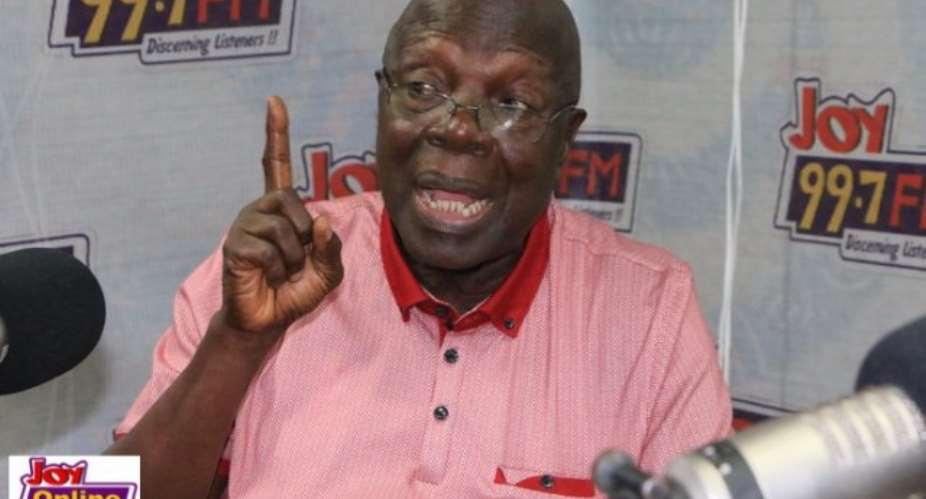Chairman of consultancy firm Ishmael Yamson & Associates says the Akufo-Addo government must work to quickly generate confidence in the economy because it is in "a very dire state."
"I just want to be very honest, this economy is...in a bad shape. If anybody tells you that there is anything to write home about I would say just be cautious" Ishmael Yamson said.
Ishmael Yamson was one of three panelists drawn from academia and business to discuss the economy on the Joy FM Super Morning Show Wednesday.
The former Unilever Board Chairman said if an economy that grew at 14.4% now grows at a 2016 estimate of 3.3%, then there is no other way to describe it except to stress that times are bad.

"Let us not make any bones about it" he said. While he would encourage Ghanaians to be hopeful, the consultant with more than 40 years experience in corporate management said "I have learnt in my career that hope has never been a strategy and can never be a strategy"
He said hope is a state of mind that must correspond with a set of action if Ghanaians are to remain confident in the government. The NPP government, he said, has inherited 'a hot potato'.
Chairman of the McDan Group of companies Daniel Mckorley agreed with Dr. Yamson's assesment of the economy but disagreed with Ishameal Yamson on superlatives.
According to him, the economy is bad but 'not very very bad', adding, his focus as a business man may turn a bad economy into a good business.
It was a point that found favour with Dr. Yamson who said as bad as the economy was, the daily demand for recharge cards should keep telcos in business.
"There are some business that are inelastic to government behaviour". But with an already bad manfacuturing sector declining by 1.1% , a bad economy only makes things worse.
Contributing to the discussion, economist with the University of Ghana Dr. Eric Osei-Asibey said the economy is not very different from what it was before Ghana entered into an IMF agreement in 2015.

A total amount of US$918 million will be given to Ghana as balance of payments support over the 3-year period. The total amount will be disbursed in eight equal tranches. Ghana has so far received three tranches.
The objective of the austerity programme is to "restore debt sustainability and macroeconomic stability to foster a return to high growth and job creation through agriculture and infrastructure investment, while protecting social spending".
It means reducing budget deficit, increasing revenue, checking public expenditure and improving exports as a way of strengthening the currency.
But these challenges still remain two years into the program. Inflation rate before the IMF program was about 17%. It is now 15.5%. Ghana had a fiscal deficit of 6.3% in 2015 and in the second year of the IMF program, the deficit is more than 7%.
Referring to economic data, the lecturer said a debt to GDP ratio of 72% is huge and raises serious challenges for the new managers of the economy. "We paying so much in servicing debt. About a quarter of our expenditure is used in servicing debts", he said.
While imports have reduced, exports have not improved in any significant measure, he said.
Although inflation rates have dropped to 15.5%, interest rates which ought to have registered a corresponding drop have "stubbornly remained very high", Dr. Assibey observed. The interest rate has been hovering around 27%.
The three panelists urged the government to focus on liberating the private sector. Daniel McKorley was emphatic that the Akufo-Addo government must " leave the job creation [agenda] to the private sector".
Story by Ghana|myjoyonline.com|[email protected]





 This IMANI job no dey pap; the people you are fighting for are always fighting y...
This IMANI job no dey pap; the people you are fighting for are always fighting y...
 Prof. Naana Opoku-Agyemang has changed; you can see a certain sense of urgency –...
Prof. Naana Opoku-Agyemang has changed; you can see a certain sense of urgency –...
 MFWA Executive Director slams Akoma FM for engaging in ‘irresponsible’ media pra...
MFWA Executive Director slams Akoma FM for engaging in ‘irresponsible’ media pra...
 ‘Women must become millionaires too’ — Prof Jane Naana on establishment of Women...
‘Women must become millionaires too’ — Prof Jane Naana on establishment of Women...
 Some believe only in Ghanaian votes, not Ghana — Kofi Asare jabs politicians
Some believe only in Ghanaian votes, not Ghana — Kofi Asare jabs politicians
 Plan to make BEST sole aggregator of Sentuo Oil Refinery will create market chal...
Plan to make BEST sole aggregator of Sentuo Oil Refinery will create market chal...
 2024 elections: I can't have the man I removed from office as my successor — Aku...
2024 elections: I can't have the man I removed from office as my successor — Aku...
 2024 Elections: Immediate-past NPP Germany Branch Chairman garners massive votes...
2024 Elections: Immediate-past NPP Germany Branch Chairman garners massive votes...
 Gov’t focused on making Ghana energy self-sufficient, eco-friendly – Akufo-Addo
Gov’t focused on making Ghana energy self-sufficient, eco-friendly – Akufo-Addo
 April 25: Cedi sells at GHS13.74 to $1, GHS13.14 on BoG interbank
April 25: Cedi sells at GHS13.74 to $1, GHS13.14 on BoG interbank
